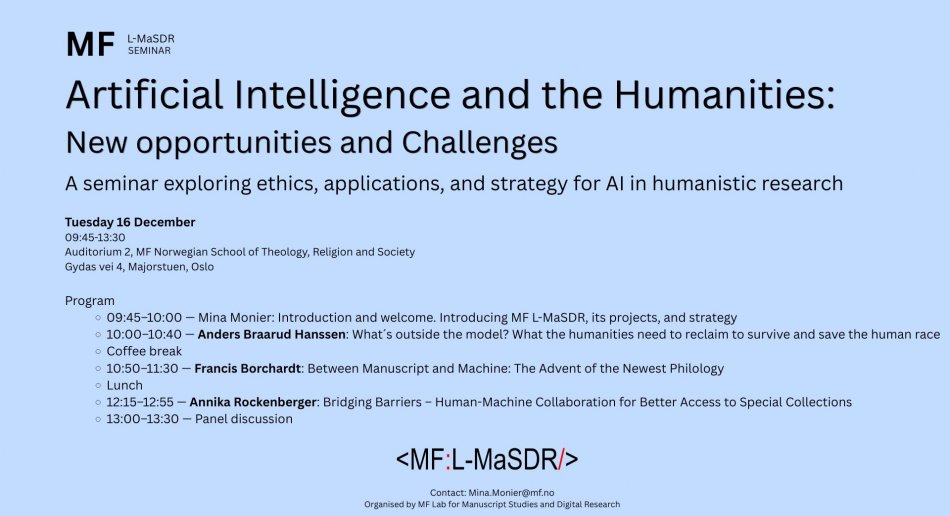
Artificial Intelligence and the Humanities: New opportunities and Challenges
- Tid:
- Sted: Auditorium 2
- Legg til i kalender
A seminar exploring ethics, applications, and strategy for AI in humanistic research
Program
09:45–10:00 — Mina Monier: Introduction and welcome. Introducing MF L-MaSDR, its projects, and strategy.
10:00–10:40 — Anders Braarud Hanssen: What´s outside the model? What the humanities need to reclaim to survive and save the human race
Coffee break
10:50–11:30 — Francis Borchardt: Between Manuscript and Machine: The Advent of the Newest Philology
Lunch
12:15–12:55 — Annika Rockenberger: Bridging Barriers – Human-Machine Collaboration for Better Access to Special Collections
13:00–13:30 — Panel discussion
Anders Braarud Hanssen (OsloMet) - What´s outside the model? What the humanities need to reclaim to survive and save the human race
Kurt Gödel, one of the most influential logicians of the 20th century, demonstrated through his incompleteness theorem that every formal system contains true statements it cannot prove from within. Logic—a foundational discipline in the humanities—reminds us of the intrinsic limits and possibilities of human interpretation and reasoning.
In the age of AI, large language models are built upon similar formal logics: they operate within predefined boundaries, reproducing patterns without genuine understanding or the capacity for radically new insights. This places the humanities at a crossroads. If we do not reclaim our definitional power, the rise of algorithmic systems may erode the interpretive, contextual, and critical reflections that are central to humanistic inquiry, while leaving the space open to actors who do not have deliberation and critical thinking as their top priority.
The humanities must actively engage with computational sciences to ensure that algorithms serve human values and do not diminish the richness at the heart of our disciplines. Most importantly, we may propose that the humanities need to reclaim critical thinking in the age of algorithms, not only for the humanities, but for humanity.
Francis Borchardt (NLA) - Between Manuscript and Machine: The Advent of the Newest Philology
This presentation explores how artificial intelligence introduces a new phase in the long history of philology. It takes as its starting point a digital-analytic project that uses LLMs to read heterogeneous archival materials, and asks how the automated extraction and correlation of textual and material evidence redefines the act of interpretation itself. Whereas traditional philology seeks meaning through critical comparison and contextual inference, AI operates through pattern recognition and association based on probabilities. This presentation argues that this algorithmic philologic exercise both extends and destabilizes the humanistic ideal of close reading. While it obviously expands our capacity to uncover connections between distinct texts and materials, it lacks any interpretive depth. By confronting AI’s “understanding without understanding,” the project forces the humanities to encounter their own methodological assumptions anew. This renewed encounter reveals the continuities and disjunctions between human and machine reading, and thereby underlines that while AI can become an important agent in the philologic enterprise, it cannot do it without the aid of human interpretation.
Annika Rockenberger (UiO) - Bridging Barriers – Human-Machine Collaboration for Better Access to Special Collections
This presentation explores an experiment conducted at the University of Oslo Library, in which machine learning algorithms were used to recognise handwritten text in 19th-century letters sent to Christopher Hansteen and the Norwegian Observatory. Following the automatic transcription, a collaborative "Transcribathon" enabled us to correct and verify the transcriptions manually, ensuring accuracy and preserving historical integrity. Utilising generative AI from the University of Oslo’s Chat GPT service, we created concise "Regesta" that illuminate the essential content of these letters, enabling broader access and understanding of our digital cultural heritage through the ALVIN platform. Throughout this talk, I will discuss the challenges and insights gained during this process, examining the transformative potential and limitations of “AI" in humanities research.
Contact: Mina.Monier@mf.no
Organised by MF L-MaSDR
